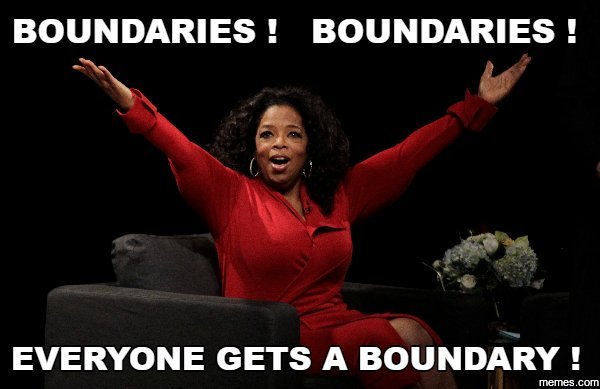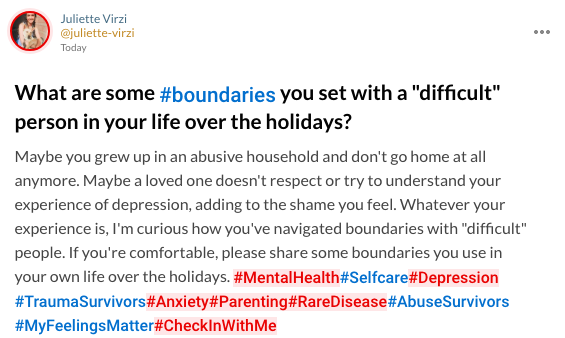Ah, boundaries. If only they were as simple as waving your hands in front of you to indicate where your personal bubble is.

Alas, establishing boundaries isn’t usually that easy, but that doesn’t mean it’s impossible — even if you’re dealing with someone who habitually doesn’t respect your boundaries.
For many people, the holidays are boundary-setting prime time. Whether you decide to go home or not, the holidays are loaded with expectations of who you “should” celebrate with and how you “should” celebrate. Because of this, we spoke to Annie Wright, a licensed marriage and family therapist (LMFT), and asked her to share her tips for navigating boundaries with someone who doesn’t respect your boundaries.
Whether it’s Thanksgiving, Mother’s Day, Groundhog Day or just your average Tuesday, these are tips you can use to navigate boundaries with difficult people in your life any day of the year.
Here’s a breakdown of some frequently asked questions about boundaries we will be discussing. To navigate the article easily, we’ve included bookmarks of the questions below, so feel free to click on the topic you find most interesting, and the link will take you to that portion of the article.
- So why are boundaries so important?
- What types of boundaries can I set with a difficult person in my life?
- Should I even have someone in my life if they don’t respect my boundaries?
- When should I consider cutting a “difficult” person out of my life?
- How can I stick to my boundaries when things get hard?
- Can I change my boundaries?
Without further ado, let’s dive in!
1. So why are boundaries important?
You might be familiar with the term “boundaries” from conversations about mental health, but it’s not just a concept for people with mental illnesses. “Boundaries are a human issue. If you are a human alive in this world, boundaries are an issue you’re gonna have to contend with,” Wright told The Mighty. She elaborated on why boundaries are so important:
Boundaries is one of those psychology terms that gets thrown around a lot, but I really truly think that boundaries are the invisible fences of our lives that are a core part of how we protect our well-being as we move through the world. There are very few other subjects that I think are as important as knowing what your boundaries are, knowing how to assert your boundaries and taking care of yourself in situations where there aren’t people who respect your boundaries. Really boundaries can be physical, emotional, spiritual, sexual, mental — and how well we know and how well we protect our boundaries really influences the quality of our life. That’s why I think this is such an key, critical topic. It’s not just pop psychology fluff, it’s actually foundational self-esteem work.
2. What types of boundaries can I set with a difficult person in my life?
Wright shared that it’s helpful to think about boundaries in three different categories: time, space and energy. When you think about that difficult person in your life, it might be worth reflecting on how much (if any) time, space or energy you can devote to that person. Remember, there’s no “right” answer, just what works best for you.
Time
Time is a category that can involve a lot of different things. For example, if a difficult person in your life lives far away, you might factor in travel time in addition to physical time spent in their presence when you are setting a time boundary.
Wright shared some other time boundaries to consider. “Think about how much time you’re willing to spend on the phone with them, or get together in person or maybe how many days you spend with them at the holidays,” she said.
Once you’ve decided on what you want your “time limit” with that person to be, think through some ways to enforce that boundary. Maybe that means calling the person when you only have a limited time to talk. Maybe that means you let the person know you need to leave in one hour if you meet up in person. Perhaps time is not something you want to devote to someone who doesn’t respect your boundaries at all, and that’s perfectly OK.

Space
Do you have a person in your life who chronically overstays their welcome or doesn’t treat your things with respect? You might consider some boundaries with protecting your space.
“The other subcategory would be space. How much do you allow them into your space? Inside your home, sharing the car ride with them, frankly how far apart you live from your family of origin — even allowing some people to see your social media accounts is a kind of space boundary,” Wright said.
Protecting your personal space doesn’t mean you love someone any less. Blocking or “unfriending” someone on Facebook or Instagram doesn’t necessarily mean you never want to see the person again. It’s important to look at your space and see what you are OK with sharing, and adjust your boundaries accordingly.

Energy
Wright defines “energy boundaries” when it comes to a difficult person in this way: “Effectively it’s how much of your mental and emotional energy these people seem to demand of you or you find yourself giving to them,” she said.
Energy might be a tricky boundary to assess because our energy levels tend to fluctuate. Some helpful questions you might ask yourself include: “How much energy do I have today to give?” and “Based on the pattern of behavior I’ve seen from this person, how much of my energy do I want to give?”
It’s not just chronically difficult or even abusive people who can sap our energy. Sometimes dear friends might need more tender loving care simply because they are going through a difficult time. Just a reminder that it’s OK to have boundaries with someone you love who is asking for more than you can give.

Wright believes thinking through these three categories is helpful in more ways than one.
Each one of these subcategories is very expandable and provides an opportunity for you to inventory your life and see if it would be helpful to set or adjust boundaries across many of these areas.
3. Should I even have someone in my life if they don’t respect my boundaries?
So what do you do when you think through your boundaries, try to enforce them and someone in your life still ignores them completely? Does that mean you automatically need to cut them out of your life?
Not necessarily.
Wright told The Mighty:
The question of ‘should you’ have people in your life who don’t respect your boundaries is completely subjective, meaning it’s up to each individual to decide. It’s really up to you to decide if you are willing and able to let these people stay in your life. As for the question of ‘can you’ let them in your life — yes, you can coexist with people who don’t respect your boundaries, but possibly not without strong and vigilant boundary-setting.
Wright said this question comes up a lot with the “permanent fixtures” in our lives like parents, siblings and in-laws. It’s important to remember it is your right to remove yourself from certain relationships if you find them to be toxic to you. Wright said,
Now I say ‘permanent’ loosely because while the family you are born into or marry into are more challenging ‘to remove’ than say, toxic friends or roommates or employees, there is still always, of course, the option of removing yourself from these people via various degrees of estrangement and distancing.
4. When should I consider cutting a “difficult” person out of my life?
Like most of the boundary questions we are discussing, there is no “one-size-fits” all answer. Wright pointed out that the question of strengthening boundaries can be so subjective because we each have different limits of what we can handle.
That being said, she does have a method for assessing whether or not you personally should consider a “bigger boundary.”
One thing I tell my clients to pay attention to is how emotionally and mentally taxed and exhausted they feel by contact with this person. Pay attention to how mentally preoccupied they feel with regards to this person and situation and notice how often their mind wanders to the fantasy of setting boundaries or getting into fights with this person. This kind of mental and emotional preoccupation is a really big clue that you’ve maybe reached your saturation point with a person and that stricter boundaries need to be set.
5. How can I stick to my boundaries when things get hard?
You might be thinking, “OK, all this information is great, but when I’m in the moment, all thoughts of boundaries go out the window…” If this sounds like you, you’re not alone.
Not being able to or having trouble with sticking to boundaries can happen for a number of reasons. Maybe the difficult person in your life is abusive and you’re feeling triggered or overwhelmed. Maybe you think to yourself, “Well maybe just this once, it’s OK…” and later realize it actually wasn’t OK. The reasons are complex, but Wright has some advice for people who are struggling with keeping their boundaries.
You really want to ground back into your reasons for [setting a boundary in the first place]. Is it to live a more independent, fulfilled, less emotionally-painful life? Is it to protect your family — the kids or the partner you have?
Wright also advises thinking through what the consequences might be if you relax or remove your boundary. Asking yourself questions like, “Knowing what I know about this person, what’s likely to happen if I change my boundary?” can be helpful in these times.
It’s worth mentioning that it’s also OK to enlist the help of a loved one if you are struggling with keeping your boundary. Wright says it’s more than OK to call upon others to support you — and in some circumstances, it’s necessary.
“In fact, if there’s a partnership where there are children and there’s a lot of complexity to the family situation, you’re going to need your partner’s support,” she said. “It might not be a choice — you might actually have to call on them to support you.”
If you compromise a boundary you set, don’t worry. Wright says this might actually be a good thing sometimes.
I do want to say that honestly, sometimes the very best thing that can happen when we need a reminder of why we have the boundaries we have in the first place is to loosen them a little bit and see what happens. Usually what happens is you get more of the same pain and drama that was there before, and that’s your reminder of why you set those boundaries in the first place. So those lived experiences through loosening them and feeling the consequences can actually be a really great form of motivation for my clients to keep sticking to their boundaries really strongly. But remember, just because you loosen a boundary once doesn’t mean you can’t reset it again.
6. Can I change my boundaries?
When you’ve relaxed a boundary with a difficult person, it can sometimes feel difficult to change your boundaries — but it’s not impossible.
“Very rarely when we loosen a boundary is it a one-time deal or a permanent loosening,” Wright said. “You have the ability and right to reinforce and reset your boundaries as often as you would like. That’s a right that all of us have.”
Boundaries can be so tricky because they are flexible as we grow and change — or as the difficult people in our lives grow and change. Don’t be afraid to adjust your boundaries if you feel like you can’t handle as much as you used to — or loosen your boundaries if you feel willing and able to let someone into more of your life.
With these tips and tricks, pretty soon you’ll be giving out boundaries like Oprah gives out cars! Happy boundary setting, everyone!

Want to join the conversation? Reply to the Question below.
Other Helpful Resources:
Quiz: Should You Go Home for the Holidays?
How to Survive Mother’s Day If Your Mother Was (or Still Is) Emotionally Abusive
16 ‘Small,’ but Significant, Boundaries People Made With an Abusive Parent
Header image via @AshleySWeitz Twitter


